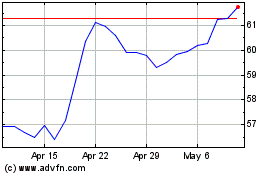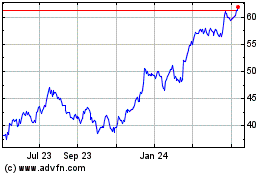By Joe Light
The government is trying to coax banks back to making mortgage
loans to risky borrowers, after a string of expensive disputes over
a federal loan program led some banks to conclude it wasn't worth
the headaches.
At issue are loans backed by the Federal Housing Administration,
a government agency that insures lenders against default when they
extend mortgages to qualified buyers with credit scores of as low
as 580 and down payments as low as 3.5%. FHA lending has grown
quickly this year, but suits brought by the Justice Department
claiming mistakes in documentation by banks underwriting the loans
have piled up as well.
The result has been billions of dollars in penalties against
banks including Bank of America Corp. and J.P. Morgan Chase &
Co. Fearing more lawsuits, some lenders have reacted by making
fewer loans through the FHA program, most often by putting in place
stronger credit requirements such as higher credit scores than the
FHA threshold.
On Tuesday, the FHA tried to ease the friction by proposing new
documents for certifying loans. FHA head Edward Golding said the
new approach leaves room for minor errors while still letting the
government pursue damages in the event of significant mistakes.
"In the end, we believe our efforts to expand access to credit
for responsible borrowers are making a difference," Mr. Golding
said on a conference call.
Some lenders were less optimistic about the new certification
requirements. Wells Fargo & Co., the country's biggest mortgage
originator and second-biggest FHA lender, said the proposed
certification process falls far short of what it had hoped and said
it would pull back from the program as a result. Last year, the
bank dialed back some restrictions it had placed on FHA loans, but
will now ramp them up again.
"This will now force us to add back certain credit overlays on
the FHA single-family program," said Mike Heid, head of Wells Fargo
Home Mortgage, in a statement.
Last month, BB&T Corp. stopped making FHA-backed loans
altogether through its own loan officers, though the bank will
continue to make such loans through correspondent lenders. A bank
spokeswoman said that BB&T planned to return to the FHA program
in about three months and that the pause to "review our processes,"
declining to elaborate.
The bank in February disclosed that it had received subpoenas
from the Justice Department related to an audit of its FHA-backed
loan business and set aside $85 million for a "potential exposure"
related to the defaulted loan losses.
Lenders made $113 billion in FHA mortgages in the first half of
2015, according to trade publication Inside Mortgage Finance, up
66% from the same period a year earlier and enough to account for
nearly one-seventh of all first-lien mortgages. At the same time,
the data show only half of the top FHA lenders in 2013 were still
in the top 10 in the first half of this year, as banks hit with
penalties have backed away.
The top FHA lender so far this year has been Quicken Loans Inc.,
which has made more than $6 billion of such loans, according to
Inside Mortgage Finance.
Quicken Loans sued the Justice Department in April, alleging
that the government was twisting its arm to admit to and settle
charges of violations it didn't commit.
The Justice Department followed shortly with its own lawsuit,
contending that Quicken originated hundreds of FHA-backed loans
that shouldn't have been eligible or that were improperly
underwritten, costing the government millions of dollars in
claims.
The Justice Department declined to comment on Tuesday's
proposal.
Quicken Loans is still looking over FHA's new proposal, but
could tighten its standards for some would-be borrowers if it
doesn't believe the FHA has reduced its exposure to future lawsuits
over mistakes, CEO Bill Emerson said.
"We haven't seen [the Department of Housing and Urban
Development] or the FHA take any real steps to improve the clarity
or rules of the road under the FHA program,"
The FHA has been a key source of mortgage financing for marginal
borrowers as banks tightened credit standards in recent years.
It required a $1.7 billion bailout from taxpayers in 2013
following crisis-era losses. More recently, the dispute over
documentation and underwriting has been caught up in the broader
showdown between the government and the banking industry over
tougher regulation in the wake of the financial crisis.
"The lenders have been holding hostage potential home buyers to
a certain extent to get the regulatory changes that they want,"
said Julia Gordon of the left-leaning Center for American Progress,
while adding that she also thinks the FHA's proposed certification
should be made more clear.
The FHA will take comments on the proposals over the next few
months before rolling out final versions of the certifications.
When mistakes have been found, the Justice Department has
sometimes pursued damages under the False Claims Act, a Civil
War-era law that lets the government recover triple damages.
David Stevens, president of the trade group Mortgage Bankers
Association, said that the new certification leaves too much
discretion for the Justice Department to pursue claims against
lenders for minor mistakes.
Write to Joe Light at joe.light@wsj.com
Subscribe to WSJ: http://online.wsj.com?mod=djnwires
(END) Dow Jones Newswires
September 01, 2015 19:10 ET (23:10 GMT)
Copyright (c) 2015 Dow Jones & Company, Inc.
Wells Fargo (NYSE:WFC)
Historical Stock Chart
From Apr 2024 to May 2024

Wells Fargo (NYSE:WFC)
Historical Stock Chart
From May 2023 to May 2024
